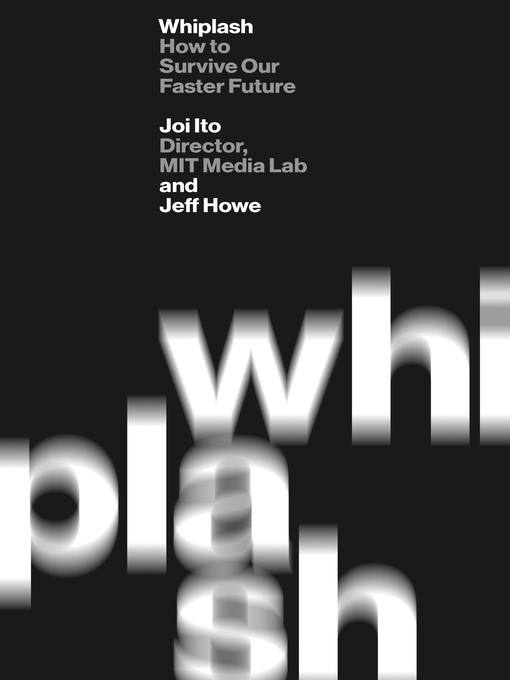
Whiplash
How to Survive Our Faster Future
کتاب های مرتبط
- اطلاعات
- نقد و بررسی
- دیدگاه کاربران
نقد و بررسی

October 17, 2016
Innovation and technology guru Howe (Crowdsourcing) teams up with his colleague Ito, an Internet privacy activist and the director of MIT’s Media Lab, for a highly entertaining and thought-provoking look at the ongoing shifts in technology and communication affecting the business sector. The authors have come up with organizing principles to help the reader navigate a chaotic landscape, focusing particularly on embracing innovation and disruption as vehicles for success. They bring abstract principles such as “Emergence over Authority” or “Systems over Objects” to life by narrating historical turning points, such as the Lumière brothers’ 1895 screening of the first motion picture; recent failures, such as Japan’s 2011 nuclear disaster; and recent innovations in technology, such as the development of bitcoin. The writing style avoids the trap of being overly conceptual and is instead snappy and accessible, sprinkled with ideas such as how to form a new “cognitive toolset” geared to ongoing advances. This provocative gem is a must-read for anyone interested in the cutting-edge research and exploration happening at MIT’s Media Lab, innovation at countless universities and companies worldwide, or futuristic thinking in general. Agent: Max Brockman, Brockman Inc.

Starred review from October 15, 2016
Two cybergurus offer a "user's manual to the twenty-first century.""Our technologies have outpaced our ability, as a society, to understand them," write MIT Media Lab director Ito and veteran Wired writer Howe (Media Innovation/Northeastern Univ.; Crowdsourcing: Why the Power of the Crowd Is Driving the Future of Business, 2008). "We need to catch up." In this heady, immensely rewarding book, they expand on the nine principles animating the celebrated MIT Lab to craft a blueprint for success in a world undergoing revolutions in technology and communications. As a result of Moore's law--everything digital gets faster, cheaper, and smaller at an exponential rate--and the rise of the internet, "the very nature of innovation" has changed, "relocating it from the center (governments and big companies) to the edges (a twenty-three-year-old punk rock musician and circuit-board geek living in Osaka, Japan)." New products are produced "at great scale and little cost in a matter of weeks, if not days." The authors devote a chapter to each of their tools for using the world's new operating system. For example, they encourage crowdfunding and using resources as needed rather than stockpiling them to exploit the reduced cost of innovation. They discuss the value of undirected discovery, the need to accept risk and experimentation ("and a willingness to fail and start again from scratch"), and the importance of maintaining "a culture of creative disobedience." They emphasize that planning is costlier than improvisation, that diverse aptitudes trump expertise, and that human systems are most resilient at their most diverse. They also argue that responsible innovation must focus on "the overall impact of new technologies." They describe how leading MIT researchers work at the lab, which Ito, an entrepreneur and college dropout, joined in 2011. This exhilarating and authoritative book actually makes sense of our incredibly fast-paced, high-tech society. A standout among titles on technology and innovation, it will repay reading--and rereading--by leaders in all fields.
COPYRIGHT(2016) Kirkus Reviews, ALL RIGHTS RESERVED.

November 15, 2016
What comes next, and are we ready for it? Two bright minds from MIT's Media Lab, Ito, its director, and Howe (Crowdsourcing), a visiting scholar, attempt to put our fast-approaching future into a framework that readers can understand. With "everything digital getting faster, cheaper, and smaller at an exponential rate," Ito and Howe propose nine organizing principles to help "bring our brains into the modern era." Each chapter is devoted to one principle and concludes with "The DIY": how to translate the principle into an "actionable strategy." This helps the reader apply the concept to a variety of industries and situations and encourages unconventional and interdisciplinary thinking. Throughout, the authors explore wide-ranging topics including artificial intelligence, the flu virus, and social engineering in an effort to illustrate their nine principles in practice. Stressing the importance of flexibility, diversity, risk-taking, and relationship-building, the book can be used as inspiration for both individuals and institutions to weather the changes ahead successfully. VERDICT A deeply researched think piece recommended for readers curious about the relationship between culture and technology as well as those who plan never to stop learning.--Cori Wilhelm, SUNY Canton Coll. of Tech. Lib.
Copyright 2016 Library Journal, LLC Used with permission.

November 15, 2016
Ito and Howe, affiliates of the MIT Media Lab, an interdisciplinary research laboratory at the Massachusetts Institute of Technology, describe nine core principles that are rapidly disrupting, shifting, and opening the world in a new direction of innovation. The principles, such as risks, diversity, and systems, derive from the collision of two important revolutions: communications and technology. Fittingly, each chapter moves quickly and offers compelling examples of how these trends challenge conventional approaches to facilitating and incubating creativity and productivity. From Bitcoin to Kickstarter, the book is filled with a variety of case studies, personal narratives, philosophical commentaries, and histories which make up Ito and Howe's core themes. With them, the authors explore where society is heading and how to make sense of these swift technological developments. Also cited are experiments and creative reflections from the MIT Media Lab which position how these principles can be applied in society. Readers interested in technology, science history, futurism, innovation, and entrepreneurship will find this book to be very fascinating, thought provoking, and focused.(Reprinted with permission of Booklist, copyright 2016, American Library Association.)

























دیدگاه کاربران